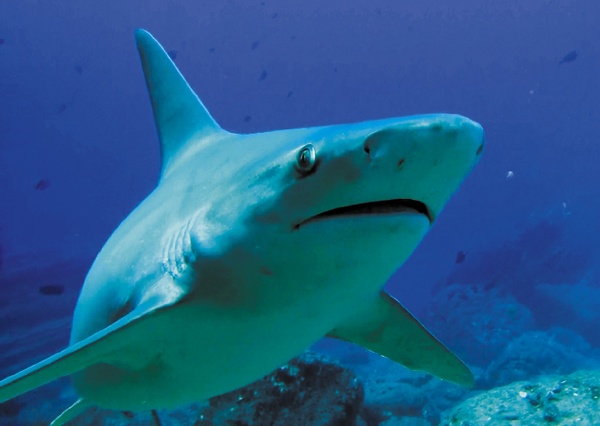LIHUE — With a pair of shark attacks in Hawaii last week, and the Discovery Channel’s Shark Week 2013 well underway, some may be having second thoughts about getting in the water.
But being bitten by a shark is unlikely. In fact, there were only 106 recorded incidents worldwide during 2012, according to the Shark Attack File website.
Although attacks are extremely rare, Don Heacock, an aquatic biologist with the state Department of Land and Natural Resources, said people must remember they enter the ocean at their own risk.
“These are predators,” he said. “They’re aquatic. We’re not.”
Heacock added that this is the time of year when many species of sharks that are common in Hawaii, such as hammerheads, come close to shore to give birth to their young.
Terry Lilley, a biologist and videographer in Hanalei who has been filming sharks for years, said that, on average, five people are killed each year by accidental shark bites — often referred to as shark attacks. He said he likes to compare that to the 150 people killed each year by falling coconuts.
“We’re not their prey item,” he said of sharks. “Thank goodness. If we were, a lot of us wouldn’t be here.”
When a shark does happen to bite a human, it is more than likely a case of mistaken identity — one reasons why bites often occur in murky water.
Of the nearly 40 species of sharks found in Hawaiian waters, the tiger shark is the “leading attack species” and one of the top three sharks implicated in unprovoked fatal attacks throughout the world, according to the National Oceanic and Atmospheric Administration’s website.
“Tiger sharks are considered particularly dangerous because of their size, and their indiscriminate feeding behavior,” according to hawaiisharks.com. “They will eat almost anything, and often feed on objects at the water’s surface. Although it’s never been proven, some bites on people may be the result of investigatory behavior; the shark bites an object (in this case a person) to determine whether it is an acceptable food source.”
On July 29, 19-year-old Kiowa Gatewood was bitten by a tiger shark while surfing in murky waters off White Plains Beach on Oahu. Three days later, on July 31, California resident Evonne Cashman, 56, was bitten by a large shark — up to 25 feet long — while swimming off Ulua Beach in Wailea, Maui. Both victims survived.
While no attacks have occurred this year on Kauai, three were recorded in 2012.
In December 2012, an unidentified 60-year-old Kalaheo man was bitten on the foot while surfing at Pakala surf break on Kauai’s Westside. The shark’s species was unknown, but officials estimated it was about 10 feet long.
In November, a 10-foot-long tiger shark bit a surfer’s board near Kekaha, but no injuries were sustained. In July 2012, 44-year-old Steve Stotts, of Lihue, was bitten on his left foot while sitting on his surf board near Gillian’s break at Mahaulepu Beach.
Between 1828 and 2012, there were 116 confirmed, unprovoked shark attacks — including eight fatalities — in Hawaiian waters, according to the Florida Museum of Natural History website. Maui topped the list with 42 attacks, including three fatalities. Oahu followed closely behind with 35 attacks, including five fatalities. On Kauai, 23 attacks were recorded during that time with zero fatalities.
The most recent shark attack death in Hawaii occurred on Maui in 2004, when 57-year-old Willis McInnis was killed while surfing in murky water near Kahana. It was the first fatal shark attack in the state in almost 12 years.
To reduce the unlikely chance of a shark attack, Heacock offered this advice: Don’t swim in dirty, murky water. Don’t eat while out swimming around. Don’t go in the water with open wounds or if you’re bleeding.
“Those are real bad ideas,” he said.
As for your fears of great whites, Heacock points out that they are cold water animals and very rarely seen in Hawaiian waters.
Heacock described sharks as “beautifully adapted fish” for the role that they play, which is acting as the “wolves” or “janitors” of the ocean.
“The movie ‘Jaws’ did the greatest injustice that anything could have done for these magnificent animals,” he said. “We need to protect sharks. Sharks have a beneficial impact on marine ecosystems because they mainly feed on the sick, dead and dying.”
Lilley agrees these animals have been misunderstood, and that “Jaws” is partially to blame.
“The movie directly led to the death of millions of sharks, senselessly,” he said.
For more information about Shark Week, which premiered Sunday, visit http://dsc.discovery.com/tv-shows/shark-week.
• Chris D’Angelo, environment writer, can be reached at 245-0441 or cdangelo@thegardenisland.com.





